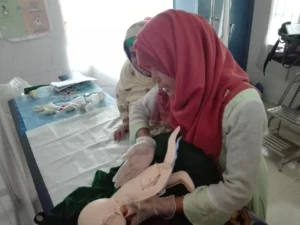Climate Resilient and Environmentally Sustainable Healthcare (CRESH)
Project highlights
Teknaf, Cox’s Bazar, Bangladesh
icddr,b
60,000+ direct beneficiaries
October 01, 2024 – September 30, 2026
Supported by

Project summary
The “Climate Resilient and Environmentally Sustainable Healthcare (CRESH)” project, funded by Novo Nordisk and implemented by Terre des hommes (Tdh) Foundation, is working to improve the climate resilience and environmental sustainability of healthcare services in Cox’s Bazar, Bangladesh. Running from October 2024 to September 2026, the project targets two primary healthcare centers in Camps 26 and 27, benefiting around 60,000 Rohingya refugees and surrounding host communities.
By using the Climate Vulnerability and Capacity Assessment (Climate VCA) methodology, the project is strengthening healthcare infrastructure, improving waste management, reducing greenhouse gas emissions, and building health workers’ ability to address climate-related health challenges. It is also advocating for policy changes and resource allocation while integrating climate adaptation measures like sustainable energy use and disaster preparedness.
Project goal
To develop sustainable and climate-resilient healthcare systems that provide primary healthcare for all while integrating climate adaptation measures and reducing the environmental footprint of healthcare services.
Key activities and achievements
- Conducting baseline assessments, and scenario-based evaluations, and developing tailored adaptation strategies for healthcare facilities.
- Upgrading primary healthcare centers with climate-resilient infrastructure, including flood-proofing, ventilation improvements, and renewable energy integration.
- Implementing eco-friendly medical waste segregation and disposal systems in two targeted healthcare centers.
- Conducting training sessions on climate-adaptive healthcare practices for healthcare workers, including doctors, nurses, and midwives.
- Organizing awareness campaigns and behavior change interventions to promote climate-smart healthcare practices.
- Developing an evidence base through data collection and research publications to advocate for sustainable healthcare policies.




